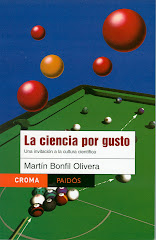by Martín Bonfil Olivera
Published on Milenio Diario, January 7, 2009
 Now that the Mexican independence bicentenary and Mexican revolution centennial are close, we should not forget that another bicentenary will be celebrated on February 12: the birth of Charles Darwin.
Now that the Mexican independence bicentenary and Mexican revolution centennial are close, we should not forget that another bicentenary will be celebrated on February 12: the birth of Charles Darwin.
Natural selection is based on the fact that organisms reproduce on unequally: some leave more descendants than others. There can be several reasons (higher physical resistance, better use of nutrients, greater fertility, descendants that are more resistant…), but most of these characteristics can be inherited. I. e., they're genetic factors.
This simple fact gets the Darwinian machinery going: descendants of advantageous organisms will inherit their advantages, and little by little these will be predominate in the population. When enough generations have passed, the totality of a species could have changed —evolved— to be better adapted to its environment. And since environments are always changing, evolution never stops. Its slow and blind accumulation of adaptations achieves the surprising designs whith which nature astonishes us.
But not only living organisms can evolve. There are a lot of other systems in which information is passed from a "generation" to another with small changes, and this immediately allows for evolution to take place. Jokes are a good example: the ones that trigger laughter are repeated by the listener, in most cases, with little changes that, if they improve it, will enhance their dispersion (if they screw it up, they can cause the joke to become "extinct").
Language, fashion, technology, ideas, religions, computer programs —and virus— and a lot of other thing also evolve by natural selection. Today we live in a more and more Darwinian world.
In future collaborations we will explore some of these ramifications. In the meantime, let us celebrate, together with the International Year of Astronomy,
(translated by Adrián Robles Benavides)
To receive Science for pleasure weekly
in your email, subscribe here!




No comments:
Post a Comment